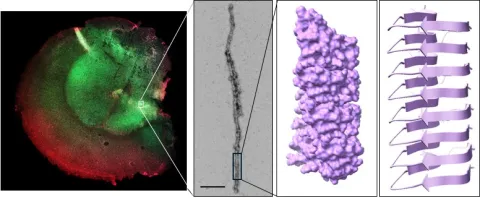Rathod Group

The Rathod group focuses on investigating the structure-function relationships in neurodegenerative diseases such as Alzheimer’s, Parkinson’s disease, and Amyotrophic Lateral Sclerosis. The unifying feature of these diseases is the change in shape (misfolding) of specific proteins in the brain, which subsequently aggregate and form long, insoluble fibrils known as amyloids.
A unique property of these amyloids is their ability to spread in a prion-like manner, where misfolded proteins can act as templates to cause normally folded proteins to adopt the same harmful structure. This process, similar to a “domino effect”, amplifies the spread of toxic proteins, disrupts cellular functions, and drives disease progression.
A key aspect of our research is determining how significant conformational changes influence protein behaviour and contribute to either gain-of-function or loss-of-function. While gain-of-function describes the acquired toxic properties associated with misfolding, loss-of-function illustrates how proteins fail to perform their essential biological roles due to changes in their secondary, tertiary and quaternary structures.
Our group uses a combination of -omics approaches with protein engineering, structural biology and high-resolution techniques to investigate these relationships.
Ongoing projects in the Rathod Lab include:
- Engineering amyloids to understand the mechanisms of misfolding using in vitro and in vivo model systems.
- High resolution structural analysis of amyloid fibrils using negative stain electron microscopy, immunogold labelling and cryo-electron microscopy.
- Developing antibodies for structural analysis and direct detection systems for neurodegenerative diseases.
- Translating structural biology into agricultural sustainability.
Trainee Opportunities: The Rathod group is always seeking motivated students for independent studies, Honours theses, MSc, PhD, and Postdocs. For more details, please contact vineet.rathod@uleth.ca
